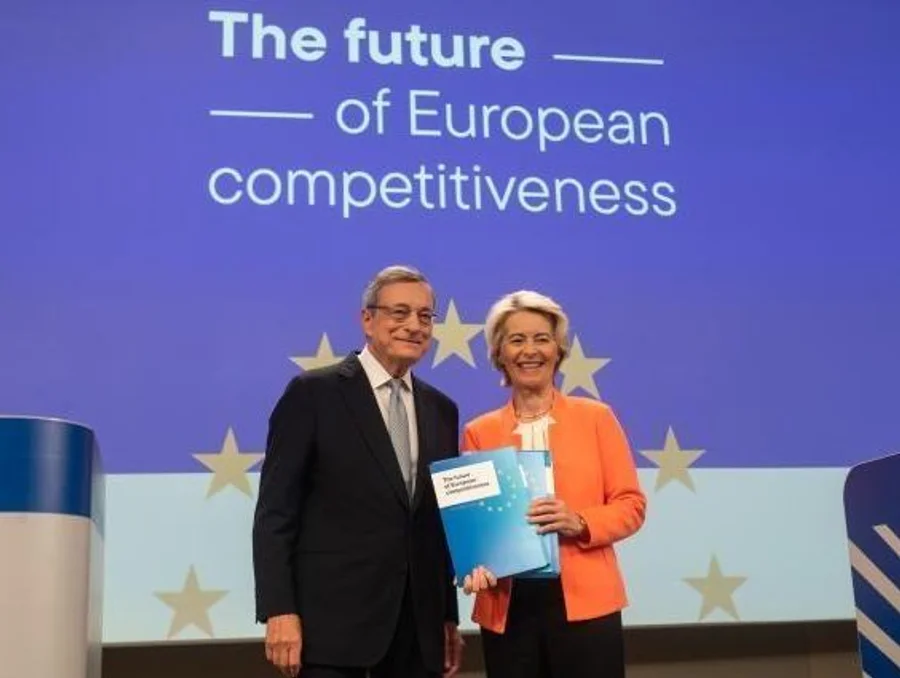The Future of European Competitiveness report details how the EU is navigating climate tech challenges and opportunities and how it can get ahead.
Technology could well be the key to hitting global climate goals, despite how energy-intensive some can be. However, in the EU there is a sense of competitiveness and division in a market dominated by a suprisingly small collection of tech industries.
The European Union Commission’s 400-page report ‘The Future of European Competitiveness’ explores the EU’s pivotal role in a world increasingly dominated by towering tech giants.
At the heart of the report is the European Union’s need to balance between economic competitiveness and climate stewardship. Author of the report Mario Draghi, ex-President of the European Central Bank and Italy’s former Prime Minister, underscores the imperative for massive investments and policy upheavals to propel Europe into the forefront of the global climate technology race.
Christian Hernandez Gallardo, Co-Founder and Partner at 2150, says: “It’s encouraging to see the EU tackle today’s most pressing needs head on, as Europe has some unique challenges to overcome if the region wants to stay competitive in a divided world.
“This is particularly true of climate technologies. The report sees these as key to future resilience and prosperity, which is more good news, but it won’t be easy for Europe’s industries to keep up.
“China dominates the production of core climate technologies like solar panels and electric cars and America’s climate tech space has been supercharged by public programmes like the Inflation Reduction Act.
“Europe comparatively lacks a united vision for the industrial or financial policy we need to tackle the climate crisis.
“Europe needs collaboration more than ever — to incentivise industrial resiliency, drive economic growth and ultimately deliver a decarbonised economy. Support for startups and their cutting edge climate solutions — particularly at the early stage — needs to be a priority to deliver these objectives.”
European climate tech
The report underscores the necessity to galvanise both private and public capital towards fostering climate tech innovation.
Setting an ambitious annual target of €800bn (US$888.9bn) for pivotal industries, the EU is on a quest to close the investment gap in emerging technologies.
Proposed strategies include bolstering public funds for burgeoning technologies, unleashing financing avenues such as contracts-for-difference alongside blended finance, and knitting a more cohesive EU capital market fabric. These measures aim to direct savings into green ventures and simplify funding accessibility for enterprises.
An audacious industrial policy is also outlined, aiming to catapult Europe as a leader in climate technologies. This includes bolstered support for key green sectors like batteries, hydrogen, and renewables.
Furthermore, the EU envisages setting minimum local production quotas for certain clean tech products in public procurement to foster predictable demand.
How can climate tech be scaled up in the EU?
Boston Consulting Group (BCG), a global consultancy with deep roots in climate change and sustainability, outlines pivotal levers for Europe’s climate tech magnification.
BCG’s blueprint underscores:
- Capital Mobilisation: A staggering estimate of US$150tn in investment capital is deemed essential globally by 2050 to hit net-zero emissions. Europe’s focus should be on ramping up capital flow to invigorate climate tech innovation.
- Enhancing Financing Mechanisms: Advancing public funding for nascent technologies, crafting new financing tools, and weaving a tighter EU capital market are crucial to green investments.
- Regulatory Simplification: Streamlining the bureaucratic tape including expedited green project permissions is key.
- Industrial Advocacy: Strategic backing for pivotal green industries is imperative.
- Forge Public-Private Alliances: BCG stresses the essence of robust partnerships between public and private entities to kindle technological investments.
- Ecosystem Cultivation: Fostering innovation ecosystems for collaborative progress across the value chain.
- Talent Cultivation: Addressing the skills gap in climate tech spheres.
- Infrastructure and Supply Chain Enhancements: Navigating through infrastructural and logistic hurdles to scale operations.
- Embrace a Long-term Outlook: Investors must be braced for a gestational period before climate technologies can scale and realise market potential fully.
- Global Collaborations: Forging industrial alliances internationally to solidify supply chains and expand new markets is essential.
As Europe manoeuvres through the intricate climate tech innovation and competitiveness landscape, implementing these strategies will be pivotal in shaping its global green economy stance.



